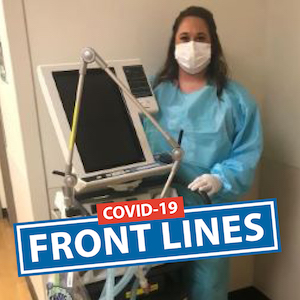 Meet Jennifer Lower, a respiratory therapist with Adena Health System working closely with COVID-19 patients daily, performing their breathing treatments, intubating patients and trying to keep them from having to go on ventilators. She has been involved with Coronavirus patients since the beginning of the pandemic, and like many of her colleagues regularly battles mental and physical exhaustion while remaining upbeat and supportive towards her patients.
Meet Jennifer Lower, a respiratory therapist with Adena Health System working closely with COVID-19 patients daily, performing their breathing treatments, intubating patients and trying to keep them from having to go on ventilators. She has been involved with Coronavirus patients since the beginning of the pandemic, and like many of her colleagues regularly battles mental and physical exhaustion while remaining upbeat and supportive towards her patients.
Here, she shares some thoughts from the front lines for members of the community to consider when deciding whether to mask, social distance, practice vigorous handwashing and avoid large gatherings.
On the emotional toll:
“It’s hard looking into the faces of these patients who know that they’re dying and they know that they don’t have their family there and you can see it in their face. While we sit there and we hold those patients, you try to tell them it’s going to be OK, but you know it’s not. I think that sticks with me the most. We won’t be able to get some of these memories out of our heads. … I don’t know that we’ll ever forget this, ever. There are some images that are etched into your brain that we’re never going to get rid of, and we all feel the same way.”
On the patients:
“Some of these patients come in and, overall, they’re healthy. Then, within a matter of hours or days, you’re literally fighting to keep them alive. … It is literally like your own family member laying there, and it’s every single patient because we’re with them every single day, and that’s what I wish people could understand. This is so physically and mentally draining, and to see people not wanting to wear a mask – if they could only see what this really does. It doesn’t discriminate – healthy or not healthy, it can treat you the same way. You can be healthy and you can still die from the virus, and we see that. They really need to understand it can get to you, too, and we don’t want to be in there holding your hand, we want you to wear a mask and do the right things to keep yourself healthy and keep your family healthy.”
On her colleagues:
“We’ve all come together, we help each other out, if we see each other crying in the hallway – because that does happen – we’re hugging each other. … I know the community can’t see it, but in here, we feel isolated, but we are fighting this for them. We want to be here for them and we don’t want to get sick, and that’s another reason why it’s important for them to just follow the guidelines.”
On protecting their own families:
“I think all of us have concerns about our families, that’s why we try to take the proper precautions when we’re at work. We change our clothes when we get here and we change them after, and even changing right when we get home – going straight to the shower. I don’t go home and hug my kids, and that’s hard for my youngest one to understand, but even if I change my clothes and take those precautions, I’m still scared to death because I do see what it can do.”
Advice to the community:
“If you’re not going to wear a mask for yourself, at least wear it for the person next to you for whom the virus may be deadly or for somebody who has a child at home who has an autoimmune disorder that could potentially be fatal. If you’re not going to do it for yourself, do it for your front line workers who are tired and need this to end, too.”
To hear more about the experiences of some of Adena’s frontline workers in the COVID-19 crisis, please see the story “COVID-19 toll intense on Adena frontline healthcare workers.”
